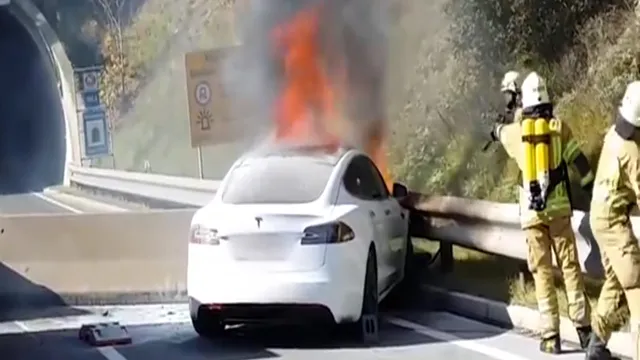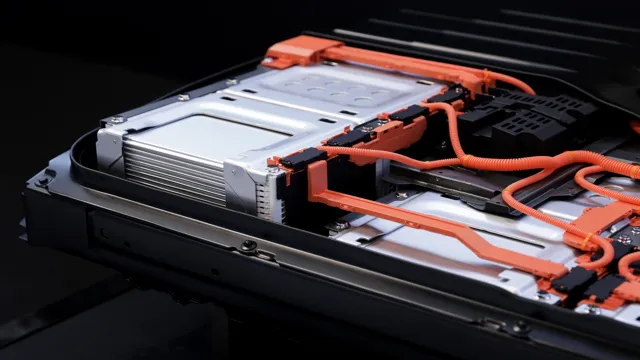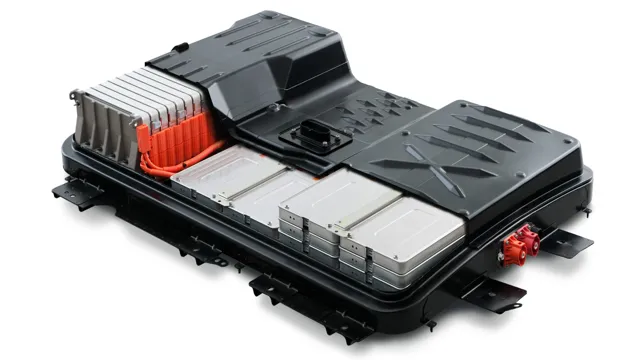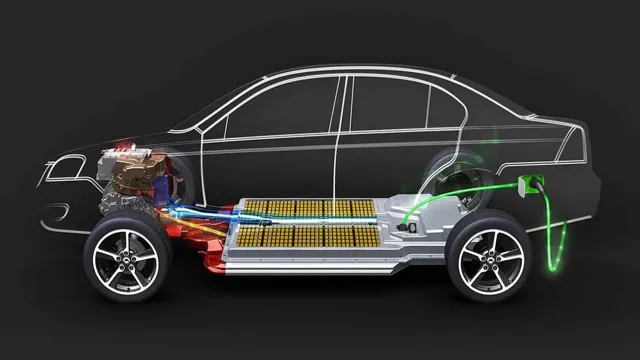Exploring the Truth Behind Electric Car Safety Concerns: Debunking Battery Fire Myths
Electric cars have gained immense popularity in recent years, thanks to their eco-friendliness and low operating costs. However, as with any new technology, questions regarding electric car battery safety have arisen. One major concern is the possibility of fires, which can be caused by overheating or short-circuits in the battery.
While the chances of this happening are relatively low, it’s always better to be safe than sorry. In this blog post, we’ll go over some tips on how to avoid electric car battery fires and keep yourself and your passengers safe while enjoying your eco-friendly ride. So, if you’re an electric car owner or considering purchasing one, read on to learn more about electric car battery safety.
Overview of Electric Car Safety
Electric car safety is a hot topic these days, and one of the biggest concerns for many people is the risk of a battery fire. While it’s true that electric car batteries can catch fire, the chances of this happening are actually quite low. In fact, studies have shown that electric vehicles are generally safer than traditional combustion engine cars.
That being said, it’s still important to take some precautions to minimize the risk of a battery fire. For example, it’s important to always follow the manufacturer’s guidelines for charging your electric car battery, as overcharging can increase the risk of a fire. Additionally, if you’re ever involved in an accident in your electric car, it’s important to turn off the car and exit safely as quickly as possible to avoid any potential risks.
So while electric car safety is certainly something to be aware of, it’s important not to let fear of a battery fire outweigh the many benefits of driving an electric vehicle.
Safety Standards and Regulations
Electric car safety is an essential aspect to consider when driving and purchasing these innovative vehicles. These cars are designed and built under strict safety regulations and standards to ensure their safety and the safety of passengers and pedestrians on the roads. The battery systems of electric cars are isolated from the rest of the vehicle and equipped with advanced safety features like thermal management systems, overcharging prevention, and even safeguards to prevent accidental disassembly.
Additionally, electric cars undergo rigorous safety tests that exceed traditional gas-powered vehicles, including crash tests, fire safety, and electrical safety tests. In summary, electric car manufacturers prioritize the safety of their vehicles and adhere to high safety standards and regulations set by organizations like NHTSA (National Highway Traffic Safety Administration) and IIHS (Insurance Institute for Highway Safety). When considering purchasing an electric car, rest assured that safety remains a top priority.

Common Electric Car Safety Features
When it comes to electric car safety, there are several features to consider. One of the most important is the battery safety system, which is designed to prevent overheating or other issues that could lead to a fire. Another critical feature is collision avoidance, which can help prevent accidents by automatically stopping the car if it senses a potential collision.
Many electric cars also come equipped with advanced airbag systems and seatbelt pretensioners, which can help keep passengers safe in the event of a crash. Additionally, some electric cars come with pedestrian detection systems, which can help prevent accidents involving pedestrians or cyclists. With these safety features in place, electric cars offer a safe and reliable alternative to traditional gas-powered vehicles, making them an excellent choice for eco-conscious consumers who prioritize safety and sustainability.
Understanding Battery Fires
Electric cars are becoming more popular as we look for sustainable solutions for our transportation. However, concerns have been raised about their safety, particularly those related to battery fires. It is essential to understand what causes these fires and how they can be prevented.
The batteries in electric vehicles are powerful, and they store a lot of energy. The most common cause of battery fires is thermal runaway, which occurs when the battery becomes too hot and starts releasing energy at a much faster rate, creating a chain reaction that can lead to an explosion. To prevent this, manufacturers use cooling systems and limit the battery’s charging and discharging rates.
Additionally, educational efforts are being made to help drivers recognize the warning signs of battery degradation or malfunctions before a fire occurs. Electric car safety battery fires are a serious concern, but with proper precautions and education, we can ensure that electric vehicles are just as safe as traditional gas-powered cars.
Causes of Electric Car Battery Fires
Electric car battery fires can be caused by a variety of factors. One of the primary culprits is overheating, which can occur when the battery is exposed to extreme temperatures or when the cooling system fails. In addition, manufacturing defects can also lead to battery fires, as can physical damage to the battery from accidents or improper handling.
It’s important to note that while electric car battery fires do occur, they are still relatively rare compared to the number of gasoline car fires that occur each year. Nonetheless, it’s crucial for automakers to continue developing new safety features and improving battery technology to minimize the risk of battery fires in electric vehicles, and to educate drivers on proper handling and maintenance of their vehicles to minimize the risks.
How to Prevent Battery Fires
Battery fires can often be prevented if we understand the reasons behind them. Lithium-ion batteries contain a flammable electrolyte, which can ignite when there is a short circuit or physical damage to the battery cell. Overcharging, overheating, and exposure to extreme temperatures can also lead to battery fires.
It is important to take precautions such as avoiding overcharging, using the correct charger and cable, and storing batteries in a cool, dry place. Regularly inspecting the battery for physical damage, and immediately replacing damaged batteries, is also vital. Understanding potential causes of battery fires can prevent dangerous situations from occurring.
By taking this information into account, we can ensure that our devices remain safe to use and prevent accidents from happening.
What to Do in Case of a Battery Fire
Battery fire incidents have become a concern for many people, especially with the growing number of devices that rely on batteries. Understanding battery fires is essential to know what to do in case of an emergency. A battery fire occurs when the chemicals inside the battery react and generate heat beyond what the battery can handle.
This heat can cause the battery to rupture and release flammable gases. In most cases, the battery fire could be severe and cause extensive damage to properties and even lead to injuries. It’s paramount to know that water can make a battery fire worse; hence, it’s not the solution.
The first thing to do in case of a battery fire is to isolate the device and turn it off. Then, evacuate the area and contact the emergency services immediately. It’s essential to know that prevention is better than cure.
Avoid overcharging batteries, using damaged batteries, or exposing them to high temperatures as they can increase the risk of battery fires.
Statistics on Electric Car Safety and Battery Fires
Electric cars are growing in popularity due to their sustainability and cost-saving benefits, but some may wonder about their safety, particularly when it comes to battery fires. It’s essential to understand the statistics on electric car safety and battery fires to determine the risk level and safety features of these cars. According to a study by the National Highway Traffic Safety Administration, electric vehicles’ crash rates are generally no different from those of gas-powered cars.
Additionally, electric car batteries have a lower risk of fire than gasoline cars, as reported by a study by The Insurance Institute for Highway Safety. As for the risk of battery fires in electric cars, it’s relatively rare, with only a few reported cases. Moreover, electric car manufacturers prioritize passenger safety and have implemented innovative battery safety features, such as a liquid conductive cooling system and durable battery cages.
Overall, the statistics on electric car safety and battery fires suggest that electric cars are a safe and reliable transportation option that continues to improve in technology and safety features.
Recent Cases of Electric Car Battery Fires
Electric car safety, battery fires In recent years, there have been several cases of electric car battery fires reported in the media, raising concerns about the safety of these vehicles. While any car, whether fueled by gas or electricity, can experience a fire, the potential for a battery fire in an electric car is a valid concern due to the large amount of energy stored in the battery. However, it’s important to note that the risk of a battery fire in an electric car is still relatively low.
According to the National Fire Protection Association, there were an estimated 174,000 gas car fires in 2018 compared to just 20 electric car fires. Statistically, electric cars are still safer than gas-powered vehicles. Additionally, electric car manufacturers are continuously improving the safety of their vehicles and investing in research for further advancements.
While there have been cases of battery fires, the benefits of electric vehicles, such as reduced emissions and a lower overall carbon footprint, make them a viable and responsible option for environmentally conscious consumers.
Comparing Electric Car Safety to Gasoline Cars
When it comes to safety, many people are curious about how electric cars compare to gasoline cars. While gas-powered cars are more established, have been on the road for decades and have a long-standing safety record, electric cars are relatively new in the market with fewer safety incidents. According to the National Highway Traffic Safety Administration (NHTSA), electric vehicles are just as safe as gasoline cars.
There are notable differences, though, such as the risk of battery fires in electric vehicles. Fortunately, while battery fires are a concern, they are rare. In contrast, gasoline car fires happen regularly and have been responsible for numerous fatalities over the years.
Therefore, it’s essential to look beyond the headlines when comparing electric car safety to gasoline vehicles.
Takeaways: Electric Car Battery Safety Tips
Electric car safety is a crucial element to consider as the popularity of electric cars continues to grow. One significant concern among electric car users is the risk of battery fire. Although rare, battery fires can happen and knowing how to prevent them is key to ensuring safety.
Preventative measures like avoiding using aftermarket chargers, securing the battery hold-downs properly, and keeping the battery cool in hot temperatures can go a long way in preventing fires. Another important factor is knowing what to do if a fire does occur, such as evacuating the area immediately and contacting emergency services. Overall, being mindful of electric car battery safety tips can help prevent the risk of battery fire and ensure a safe and enjoyable drive.
Conclusion
In conclusion, while the idea of a car battery catching fire may seem scary, it’s important to remember that electric car safety measures have come a long way. With the development of stronger and more resilient battery materials, as well as advancements in battery management technology, the likelihood of a battery fire is incredibly low. It’s just one more reason to consider making the switch to an electric vehicle – after all, electric cars are not only safe, they’re also good for the environment and your wallet.
So why not give them a chance? You might just be pleasantly surprised by what they have to offer!”
FAQs
What safety measures are in place to prevent battery fires in electric cars?
Electric car manufacturers implement various safety measures to prevent battery fires in their vehicles. These include using high-strength, fire-resistant materials for the battery pack, implementing temperature monitoring and control systems, and providing extensive testing and safety certifications before releasing the vehicles to the market.
Are electric cars more prone to battery fires than gasoline-powered cars?
While the risk of battery fires in electric cars is not negligible, it is generally considered to be less than the risk of fires in gasoline-powered cars. This is because gasoline is more flammable and combustible than the materials used in electric car batteries, and electric cars typically have more advanced safety features and are subject to rigorous testing and certification.
Can electric car owners do anything to minimize the risk of battery fires?
Yes, there are several steps electric car owners can take to minimize the risk of battery fires. These include following the manufacturer’s guidelines for charging and maintenance, avoiding exposing the battery to extreme heat or cold, and being vigilant for any warning signs of battery malfunction, such as unusual smells, strange noises, or reduced performance. In case of any such signs, contacting a qualified technician immediately is highly recommended.
What should I do in case of a battery fire in my electric car?
In case of a battery fire in your electric car, the most important thing is to evacuate the vehicle immediately and call the emergency services. Never attempt to put out the fire yourself or use water, which can exacerbate the fire and present electric shock hazards. Follow the instructions of the emergency responders and make sure to stay clear of the scene until it is deemed safe.






